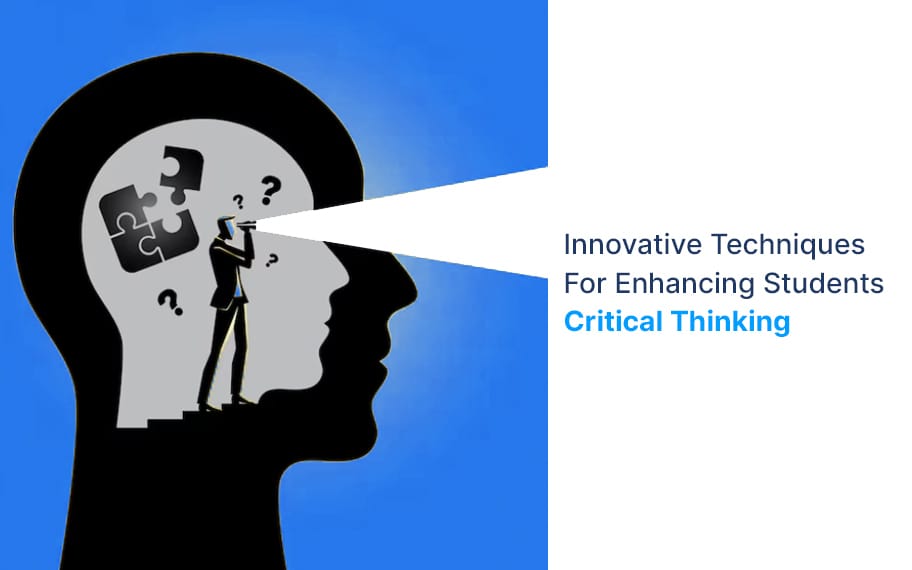Teaching parents and educators how to help pupils develop critical thinking abilities is essential in today's fast-paced, information-rich society. Globally, parents understand the value of critical thinking in their child's education. They are aware that their kids' success depends on these abilities. Critical thinking is highly valued by businesses, according to surveys from Aspiring Minds and the Confederation of Indian Industry (CII). Let's examine this's significance.
Why Critical Thinking Matters
Beyond just being a catchphrase, critical thinking is essential to succeed in the twenty-first century. It enables learners to assess, analyse, and make informed decisions. Here's why it's important to be critical:
- Solving Problems
Students who participate in critical thinking exercises develop the creative and logical problem-solving skills that are essential for success in both school and life. - Well-Informed choice-making
Critical thinking assists students in sifting through information, evaluating sources, and making informed decisions in an information-rich environment. It gives individuals the ability to make informed decisions and to digest information wisely. - Flexibility
Being flexible is crucial in a world that is changing all the time. By using critical thinking, kids may adapt to changing circumstances, gain knowledge from past mistakes, and flourish in a variety of settings.
Schools' Role in Fostering Critical Thinking
Schools play a crucial role in nurturing critical thinking. They create an environment where children can learn and practice these skills every day. Apart from the learning environment, certain skills can advance them even further. Here are some such skills and how they contribute to this essential intellectual discipline:
1. Robotics Education
Robotics courses challenge students to think critically as they design, build, and programme robots. These courses encourage problem-solving, experimentation, and applying scientific principles in real-life situations.
2. Coding
Coding courses require students to think logically and critically as they write code to create software, applications, or games. Coding promotes computational thinking, problem-solving, and creativity.
3. Artificial Intelligence
AI courses introduce students to the world of artificial intelligence, where they learn to develop algorithms, machine learning models, and AI applications. These courses encourage students to think critically about data, patterns, and real-world AI applications.
4. Effective Communication
Effective communication is another essential part of critical thinking. Schools foster this skill through activities like debates, group discussions, and persuasive writing assignments. These activities improve communication skills while also enhancing the creative thinking skills of students as they analyse and present their ideas.
By including these hands-on classes in the curriculum, instructors not only provide students with valuable life skills but also give them the chance to practice critical thinking in practical settings, preparing them for the challenges of the twenty-first century.
Practical Techniques for Fostering Critical Thinking
Here are practical techniques that parents can use to help their children develop critical thinking skills:
1. Encourage Curiosity
Establish a space where asking questions is welcomed. Encourage kids to research subjects they are interested in and to pose questions.
2. Promote Reading
Children who read are exposed to a variety of viewpoints and concepts. Urge them to read widely and engage in critical analysis and thought by having them discuss what they've read.
3. Problem-Solving Activities
Engage kids in puzzles and activities that require problem-solving. Encourage children to solve problems independently to develop their creativity and critical thinking skills.
4. Encourage Discussions
Encourage candid conversations where kids feel free to share their ideas. Encourage them to share their perspectives in order to aid in the development of critical thinking and excellent communication abilities.
5. Real-World Applications
Make connections between school-based learning and real-world problems. Motivate them to put what they've learned into practice by highlighting the usefulness of critical thinking abilities.
6. Encourage Decision-Making
Involve children in making decisions at an appropriate level. Let them make choices, weigh pros and cons, and learn from the outcomes.
To Sum Up
To sum up, critical thinking is an important ability that kids need to have in order to flourish in the modern world. Schools may help children develop this talent by providing them with opportunities to engage in critical thinking in subjects like robotics, coding, artificial intelligence, and effective communication. By fostering curiosity, boosting reading, participating in problem-solving activities, encouraging open discussions, stressing real-world applications, and supporting decision-making, parents may help their children develop critical thinking abilities.
By fostering these abilities, we set up our kids to succeed in a world that is always changing and to become future leaders and innovators. The 21st century economy depends on critical thinking, and it begins with our children.
Learn more about Teachmint plans here.












